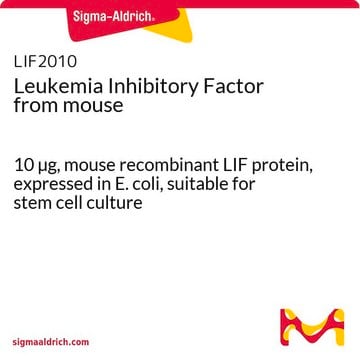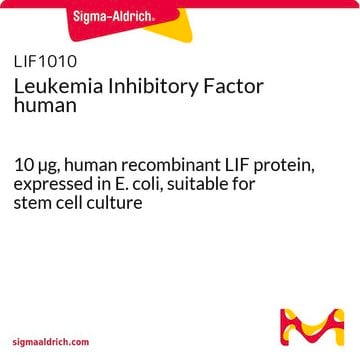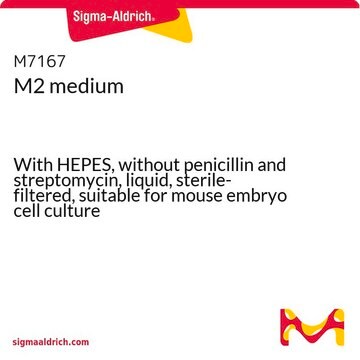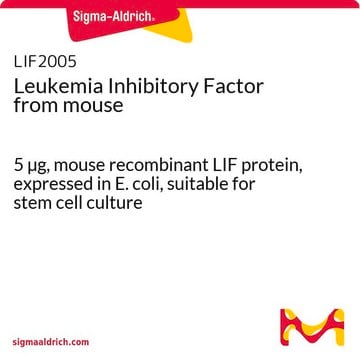ESG2206
ESGRO® Recombinant Rat LIF Protein
ESGRO Leukemia Inhibitory Factor (LIF) supplement for rat ES cell culture. Each vial contains 10^6 units/ml
Synonym(s):
Rat LIF
About This Item
Recommended Products
Quality Level
Assay
>85% (active component rat LIF (rtLIF), SDS-PAGE)
form
liquid
manufacturer/tradename
Chemicon®
concentration
1000000 units/mL
technique(s)
cell culture | stem cell: suitable
input
sample type induced pluripotent stem cell(s)
sample type: mouse embryonic stem cell(s)
UniProt accession no.
shipped in
dry ice
General description
Application
Rat ES Cells: RtLIF produced from a transfected cell line, has been shown to effectively maintain the undifferentiated phenotype of rat ES cells when used at a concentration of 1000-1500 units / mL (Takahama et.al. 1998).
At this recommended concentration 106 units of ESGRO is sufficient for 1L of tissue culture media.
Visit www.esgro-lif.com for additional information
Rat LIF is not available for resale.
For research use only; not for use as a diagnostic.
Packaging
Quality
Caution
Physical form
Rat ESGRO is supplied 0.22 micron sterile filtered, and tested negative for mycoplasma.
Storage and Stability
For long term storage it is recommended that Rat ESGRO concentrate be stored at -20°C.
It is recommended that prior to use, Rat ESGRO should be diluted in sterile tissue culture media and aliquoted to a convenient concentration, then stored at -20°C. Freeze thawing will reduce potency and is not recommended.
Analysis Note
Legal Information
Disclaimer
Storage Class Code
10 - Combustible liquids
WGK
WGK 2
Regulatory Listings
Regulatory Listings are mainly provided for chemical products. Only limited information can be provided here for non-chemical products. No entry means none of the components are listed. It is the user’s obligation to ensure the safe and legal use of the product.
JAN Code
ESG2206:
Certificates of Analysis (COA)
Search for Certificates of Analysis (COA) by entering the products Lot/Batch Number. Lot and Batch Numbers can be found on a product’s label following the words ‘Lot’ or ‘Batch’.
Already Own This Product?
Find documentation for the products that you have recently purchased in the Document Library.
Articles
Leukemia Inhibitory Factor (LIF) is a stem cell growth factor used for the in vitro culture of pluripotent mouse embryonic stem cells (ES cells).
Our team of scientists has experience in all areas of research including Life Science, Material Science, Chemical Synthesis, Chromatography, Analytical and many others.
Contact Technical Service







